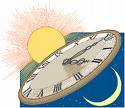Daylight Saving Time and Heart Problems Could Be Linked
 Swedish researchers have found a 5% drop in heart attacks deaths and hospitalization after the semi-annual one-hour time changes to mark the end of daylight saving times. According to a study to be published Thursday in the New England Journal of Medicine, the onset of daylight saving time in the spring appears to increase the risk of heart attacks.
Swedish researchers have found a 5% drop in heart attacks deaths and hospitalization after the semi-annual one-hour time changes to mark the end of daylight saving times. According to a study to be published Thursday in the New England Journal of Medicine, the onset of daylight saving time in the spring appears to increase the risk of heart attacks.
In the recent study Dr. Imre Janszky of the Karolinska Institute in Stockholm, and Dr. Rickard Ljung of Sweden's National Board of Health and Welfare examined data from the Swedish Myocardial Infarction Register, a catalog of all heart attacks in Sweden that resulted in hospitalization or death. They worked out the number of heart attacks from 1987 to 2006 in the week after the clocks were reset and compared the result to the number of heart attacks a few weeks prior to the resetting. They found that the number of heart attacks was 2140 for the weeks prior to daylight saving and it dropped by 5 % to 2038 after daylight saving time ended also the effects tended to be stronger for people younger than 65 than for those over 65. The number of heart attacks increased on Monday, Tuesday and Wednesday after the beginning of daylight saving time began ranging from 6-10%.
Dr. Janszky, said, "This was the very first study on this topic and further studies are needed. However, we can certainly say that our study adds some further evidence that vulnerable individuals might benefit from avoiding sudden changes in their biological rhythms."
Susan Zafarlotfi, clinical director of the Institute for Sleep-Wake Disorders at Hackensack University Medical Center in New Jersey felt the reason was sleep deprivation. "When somebody has sleep deprivation, obviously that deprivation does affect their health, including the possibility of having heart attack and stroke," said Zafarlotfi. "Those patients who do have a higher risk -- such as high cholesterol and, specifically, if they snore -- should be very, very careful with their time to bed and time to rise, not only for the fall back but also across the board." The reason she explained was "Our circadian rhythm, which is the biological clock within the human body, gets its cues from time and light. This coming Sunday when we go backwards, our bodies are not going to be clocking so quickly, so the clinical consequences would be fatigue, tiredness and a little bit of lack of attention and lack of concentration."
Daylight saving time was proposed by William Willett, a British builder in 1905 and the idea caught on in 1916. Twice every year more than 1.5 billion people reset their clocks to try to make the most of the daylight that is available. The average rest a person gets every night has decreased from 9 hours to 7.5 hours over the last century.
Dr. Martha L. Daviglus, a professor of preventive medicine at Northwestern University's Feinberg School of Medicine in Chicago said, "Ninety-nine percent of the people that die of myocardial infarctions, they have risk factors for cardiovascular disease," she said. "Changing the clock, in my opinion, is nothing compared to the major risk factors."